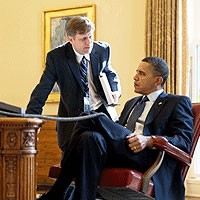Domestic affairs mold Obama’s Russia policy – Russian experts

(Interfax – MOSCOW, August 12, 2013) U.S. President Barack Obama has sacrificed relations with Russia in order cooperate with the Republicans in the promotion of domestic policy interests, experts told Interfax.
“Obama has to make a choice. The term of his presidency is running out. He is supposed to leave a legacy, such as the endorsement and completion of his healthcare reform that is likely to put him down in history. There are some other subjects requiring interaction with the Republican members of Congress or others. Russia does not belong to the group of themes important for his legacy,” Foreign and Defense Policy Council head Fyodor Lukyanov said.
“Obama will not have another conflict with the Republicans over Russia, which may risk his key priorities. That is a totally rational prioritization,” he said.
Besides, a negative image of Russia has lately taken shape in the United States, the expert added.
“The image of Russia in the United States has largely deteriorated in the past year. Certain steps of Russia added to that, first of all, the decision to ban adoptions and even the way in which that decision was made and the agitation caused by it. So, the public has a negative attitude, and Obama has lots of other needs and political necessities. After all, why should he take a risk just so that he could go to Moscow and discuss whatever came to the fore?” Lukyanov wondered.
Director of the Russian Academy of Sciences’ Institute for U.S. and Canadian Studies Sergei Rogov agreed with Lukyanov.
“Doubtlessly, this conclusion (about the exacerbation of relations with Russia to please the Republicans) has its reasons. Obama is dealing with the extremely fierce resistance of the Republican Party on practically every issue, primarily the issues of top priority for Obama. These are the reforms of healthcare and the immigration policy,” he said.
Rogov also pointed to the recent rapprochement of Obama with the notorious critic of the Russian authorities, Republican Senator John McCain.
“Senator McCain, who is one of the most prominent critics of the Obama policy, first of all, the reset policy concerning Russia and the U.S. domestic policy, such as the immigration and healthcare reforms, has been lately making appeasing statements. In fact, he may play a certain role and win some Republican votes for Obama in Congress. It is quite possible that a concession to McCain on the question of relations with Russia is a lesser evil for Obama that to conceding his priorities in U.S. domestic affairs,” the expert said.
As to the Monday article in Kommersant, which quoted the opinion of a diplomat that Obama might have been turned against Russia on purpose, both experts allowed for that probability.
“Obviously, somebody must be influencing him all the time,” Lukyanov said.
He however doubted that the Obama administration was divided over relations with Moscow.
“I’d rather say this is not a split of elites but an attempt to rethink the situation because the methods which the United States has traditionally applied have stopped working for various reasons. This is happening in every acute foreign political matter. Russia is a part of this problem but it is certainly not the main part,” he said.
“Yet, in my opinion, we should not be speaking about a split or polarization of opinions but noting that the relations are being downgraded. The bilateral agenda, which was covering various spheres of cooperation and interaction between the United States and Russia, has been gradually lessening. Actually, there is practically nothing left on that agenda. Even the traditional problem of nuclear reductions is not being discussed because Russia does not wish to do so,” the expert said.
“Concerning the diplomatic routine, i.e. participation of the United States and Russia in the settlement of international crises in Syria, Afghanistan, Iran, North Korea and so on, this is the area of concentration of main events. Everything has been limited to that. As John Kerry, who is in charge of daily diplomacy, is dealing with these matters he is interested in having a normal and working dialogue with Russia on every question of this type. Other politicians and officials who take a look at U.S.-Russian relations can see there is nothing to discuss there. Hence, I would say this is not a split of elites but the end of the old model. There is no new (model) or new fields of interaction for the United States and Russia so far,” Lukyanov said.
“This (the turning of Obama against Russia) cannot be ruled out but there is no tangible evidence to this conclusion,” Rogov said.
Susan Rice, who is known for her tough attitude towards Russia and who might have influenced the decision of Obama not to attend the Moscow summit, has been recently appointed the National Security Advisor, Rogov said.
“Rice has not made public statements so far. Therefore suppositions may be made but it would be premature to declare this a fait accompli,” the expert said.
